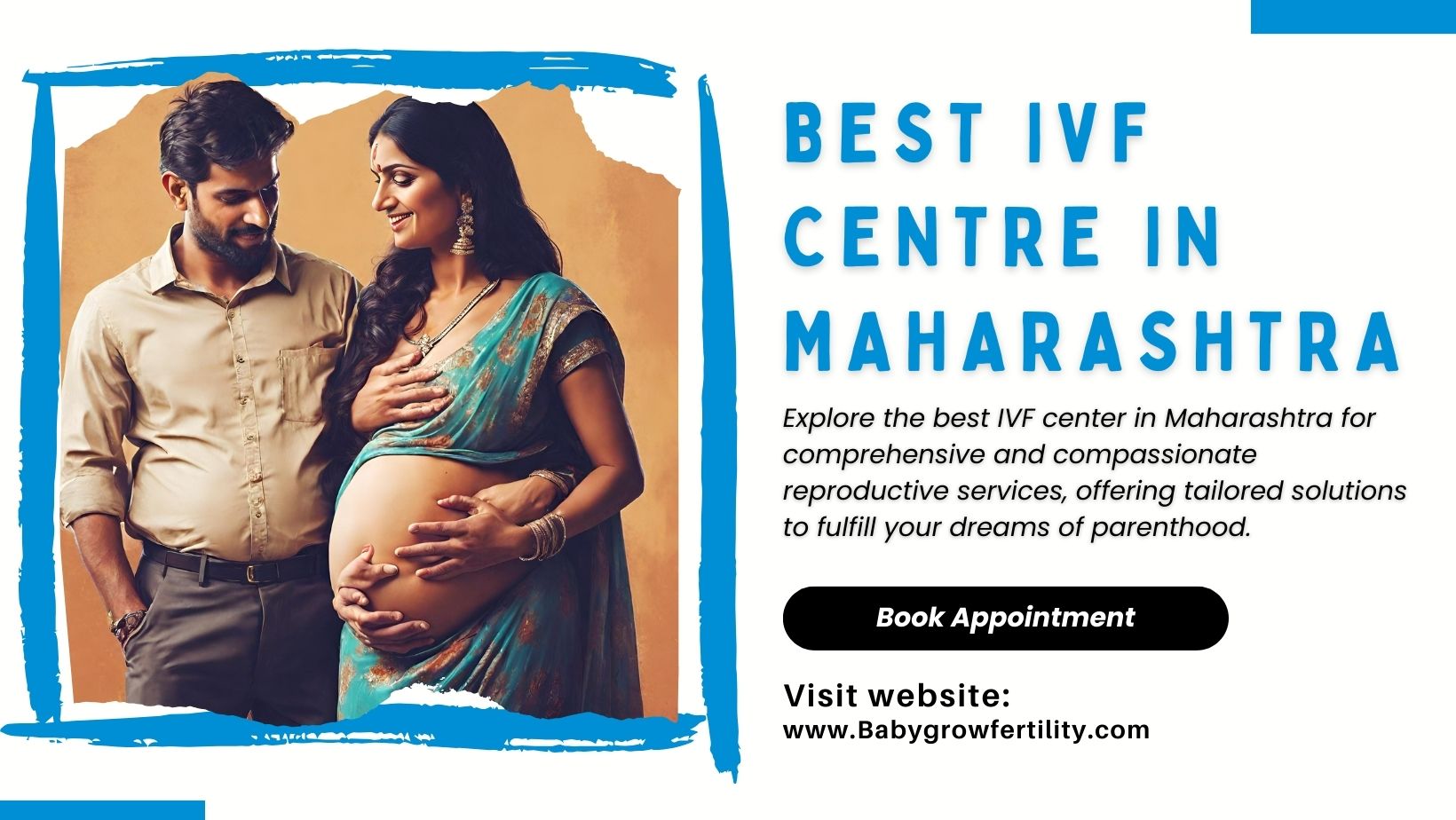Welcome to the forefront of fertility care: the Best IVF Centre in Maharashtra. As a beacon of hope for couples struggling with infertility, our center offers a comprehensive range of assisted reproductive technologies and personalized treatments.
With a team of renowned fertility specialists and cutting-edge facilities, we are committed to providing exceptional care and achieving the best possible outcomes for our patients. From thorough diagnostics to advanced IVF procedures and compassionate support, we prioritize excellence at every step of the journey towards parenthood.
Our dedication to patient satisfaction and success has earned us the reputation as the premier IVF Clinic in Maharashtra. Experience the difference with our tailored approach and state-of-the-art techniques, as we guide you towards realizing your dream of building a family. Trust in the Best IVF Centre in Maharashtra to support you on this transformative path.
Understanding the IVF Process
In-Vitro Fertilization (IVF) is a complex medical procedure designed to help individuals and couples overcome infertility and achieve pregnancy. Here’s a detailed breakdown of each step involved in the IVF process:
Step-by-Step Guide to In-Vitro Fertilization
The step-by-step guide to in-vitro fertilization (IVF) demystifies the process, from initial consultation to embryo transfer, empowering couples with knowledge and understanding throughout their fertility journey.
Initial Consultation and Diagnosis
The journey of IVF typically begins with an initial consultation with a fertility specialist or reproductive endocrinologist. During this arrangement, the clinical history of the individual or couple is explored, and any applicable analytic tests are directed to distinguish the fundamental reasons for barrenness. These tests may include hormone evaluations, ultrasound scans, and semen analysis for male partners. Based on the findings, the fertility specialist will develop a personalized treatment plan tailored to the specific needs and circumstances of the patient.
Ovarian Stimulation and Egg Retrieval
Once the treatment plan is established, the next step in the IVF process involves ovarian stimulation to encourage the development of multiple mature eggs. This is typically achieved through the administration of fertility medications, such as follicle-stimulating hormone (FSH) and luteinizing hormone (LH), to stimulate the ovaries. Regular monitoring with blood tests and ultrasound scans is conducted to track the growth and maturation of the ovarian follicles. Once the follicles reach the optimal size, a trigger shot of human chorionic gonadotropin (hCG) is administered to induce final egg maturation. Approximately 36 hours later, the eggs are retrieved from the ovaries using a minimally invasive procedure called transvaginal ultrasound-guided follicle aspiration.
Fertilization and Embryo Development
Following egg retrieval, the retrieved eggs are immediately transferred to the laboratory, where they are fertilized with sperm through conventional insemination or intracytoplasmic sperm injection (ICSI). Conventional insemination involves placing sperm and eggs together in a culture dish, allowing natural fertilization to occur. Conversely, ICSI includes the immediate infusion of a solitary sperm into each full grown egg to work with preparation in instances of male component fruitlessness or past IVF disappointment. After fertilization, the embryos are cultured in a controlled laboratory environment for several days, typically up to five or six days, during which they undergo cleavage and development into blastocysts.
Embryo Transfer and Implantation
Once the embryos have reached the appropriate stage of development, one or more selected embryos are transferred into the uterus through a thin, flexible catheter. This procedure is performed under ultrasound guidance and is generally painless. The patient’s age, reproductive history, and embryo quality all play a role in determining the number of embryos transferred, with the goal of minimizing the risk of multiple gestations and increasing the likelihood of successful implantation. After the embryo transfer, patients are advised to rest for a brief period before resuming normal activities. Any remaining viable embryos may be cryopreserved (frozen) for future use.
Pregnancy Testing and Follow-Up Care:
Approximately two weeks after the embryo transfer, patients undergo a blood test to measure the levels of beta-human chorionic gonadotropin (beta-hCG), a hormone produced by the developing placenta during early pregnancy. A positive beta-hCG result indicates the presence of pregnancy, while a negative result suggests that the embryo transfer was not successful. In case of a positive pregnancy test, patients will keep on getting progressing observing and support from their richness center to guarantee the wellbeing and reasonability of the pregnancy. This may include additional blood tests, ultrasound scans, and prenatal care to assess fetal development and maternal well-being. In cases of unsuccessful IVF cycles, patients may have the opportunity to discuss their options for future treatment and explore alternative pathways to parenthood.
Baby Grow fertility (Best IVF Centre in Maharashtra)
Welcome to Baby Grow Fertility, recognized as the Best IVF Centre in Maharashtra, where we offer a comprehensive range of fertility services to help you achieve your dream of parenthood.
Our state-of-the-art facility is equipped with advanced technology and staffed by experienced fertility specialists dedicated to providing personalized care. From IVF and Surrogacy to PGD, Egg Donation, Test Tube Baby, Laser Assisted Hatching, IUI Treatment, and Hysteroscopy, we offer a full spectrum of assisted reproductive treatments tailored to your unique needs.
With a commitment to excellence and compassion, we strive to support you throughout your fertility journey. At Baby Grow Fertility, we believe that everyone deserves the opportunity to build a family, and we are here to make that dream a reality for you. Trust in us as your partner in creating new beginnings.
- Phone number: +91 8287411159
- Email: [email protected]
- Website: www.babygrowfertility.com
Cost of IVF in Maharashtra
Understanding the Cost of IVF in Maharashtra is pivotal for those exploring alternative paths to parenthood. Our center ensures transparency in pricing, with typical surrogacy costs in Maharashtra ranging from 8,00,000 to 15,00,000 INR. This encompasses various aspects such as medical procedures, legal fees, and compensation for the surrogate. We strive to make surrogacy accessible to all deserving individuals, offering flexible payment plans and compassionate support throughout the process. With our experienced team and commitment to affordability, we aim to alleviate financial concerns and guide you towards fulfilling your dream of starting a family through IVF in Maharashtra.
Benefits and Risks of IVF Treatment
In-Vitro Fertilization (IVF) is a widely used assisted reproductive technology that offers hope to couples facing infertility. However, like any medical procedure, IVF comes with its own set of benefits, risks, and ethical considerations. Here’s a closer look at each aspect:
Advantages of IVF for Couples Facing Infertility
IVF provides several advantages for couples struggling with infertility, including:
Overcoming Various Causes of Infertility: IVF can help couples overcome a wide range of infertility issues, including tubal factor infertility, male factor infertility, ovulatory disorders, endometriosis, and unexplained infertility. By bypassing common barriers to conception, such as blocked fallopian tubes or low sperm count, IVF offers a viable solution for many couples.
Increased Pregnancy Success Rates: IVF has been associated with higher pregnancy success rates compared to other fertility treatments, particularly in cases of severe male factor infertility or advanced maternal age. The ability to select the healthiest embryos for transfer and bypass potential reproductive obstacles can improve the likelihood of achieving a successful pregnancy.
Customized Treatment Options: IVF treatment can be tailored to meet the specific needs and circumstances of individual patients. Fertility specialists can adjust various parameters, such as medication protocols, embryo transfer techniques, and preimplantation genetic testing, to optimize the chances of success while minimizing potential risks.
Opportunities for Genetic Screening: IVF allows for comprehensive genetic screening of embryos before transfer, offering couples the opportunity to identify and potentially avoid passing on genetic disorders to their offspring. Preimplantation genetic testing (PGT) can screen embryos for chromosomal abnormalities, single gene disorders, and structural rearrangements, providing valuable information for family planning.
Get Free Consultation
Potential Risks and Complications
Despite its many benefits, IVF is not without risks and potential complications, including:
Ovarian Hyperstimulation Syndrome (OHSS): Ovarian hyperstimulation syndrome is a common complication of IVF treatment, characterized by the excessive stimulation of the ovaries in response to fertility medications. Mild cases may cause abdominal discomfort, bloating, and nausea, while severe cases can lead to fluid accumulation in the abdomen and chest, electrolyte imbalances, and kidney failure.
Multiple Gestation: IVF treatment is associated with an increased risk of multiple gestation, including twins, triplets, or higher-order multiples. Multiple pregnancies pose greater health risks for both the mother and babies, including preterm birth, low birth weight, preeclampsia, gestational diabetes, and neonatal complications. Strategies such as elective single embryo transfer (eSET) can help reduce the risk of multiples while maintaining high success rates.
Ectopic Pregnancy: IVF pregnancies have a slightly higher risk of ectopic pregnancy, where the fertilized embryo implants outside the uterus, typically in the fallopian tubes. Ectopic pregnancies can be life-threatening if not diagnosed and treated promptly, requiring medical intervention such as medication or surgery to prevent complications.
Ethical Considerations and Legal Framework
IVF raises complex ethical and legal questions surrounding issues such as:
Embryo Disposition: IVF often results in the creation of multiple embryos, leading to decisions regarding the disposition of unused embryos. Couples may choose to cryopreserve (freeze) remaining embryos for future use, donate them to research or other couples, or undergo embryo disposition procedures such as donation, thawing, or disposal.
Reproductive Rights and Autonomy: IVF raises important questions about reproductive rights, autonomy, and informed consent. Patients have the right to make decisions about their fertility treatment based on their personal beliefs, values, and medical circumstances, while also considering the welfare of any resulting offspring.
Access and Equity: IVF treatment can be costly and may not be accessible to all individuals and couples, raising concerns about equity and socioeconomic disparities in access to reproductive healthcare. Efforts to improve affordability, insurance coverage, and access to fertility services are essential to ensure equitable access to IVF treatment for all who need it.
Factors to Consider When Choosing an IVF Centre
- Reputation and Success Rates: When selecting an IVF center, it’s crucial to assess its reputation and success rates. Reliability and skill in achieving positive outcomes are indicators of a reputable center’s success rate. Investigating the middle’s standing through web-based audits, tributes, and verbal proposals can give significant experiences into its history and believability. Additionally, reviewing the center’s published success rates for different age groups and fertility conditions helps prospective patients gauge the likelihood of achieving a successful pregnancy.
- Expertise and Experience of Doctors: The expertise and experience of the doctors and fertility specialists at an IVF center are paramount in ensuring personalized and effective treatment. Patients ought to ask about the capabilities, certifications, and experience of the clinical group, including regenerative endocrinologists, embryologists, and richness medical caretakers. Experienced doctors who specialize in reproductive medicine possess the knowledge and skills necessary to diagnose and address complex fertility issues, maximizing the chances of successful outcomes. Patients may likewise consider factors, for example, the specialist’s correspondence style, sympathy, and bedside way while assessing their appropriateness for customized care.
- Range of Services Offered: When choosing an IVF center, it’s essential to consider the comprehensive range of services available to meet diverse fertility needs. Beyond basic IVF procedures, a reputable center should offer a variety of advanced fertility treatments and technologies, such as intracytoplasmic sperm injection (ICSI), preimplantation genetic testing (PGT), and egg freezing. Additionally, the availability of complementary services like fertility preservation, donor egg or sperm programs, and LGBTQ+ family-building options demonstrates the center’s commitment to addressing a wide spectrum of fertility challenges and preferences.
- Facilities and Technology: Assessing the facilities and technological capabilities of an IVF center is crucial for ensuring optimal patient care and treatment outcomes. Best in class research facilities furnished with cutting edge conceptive innovations and gear assume a huge part in the progress of IVF methods, including undeveloped organism culture, hereditary testing, and cryopreservation. Patients ought to ask about the middle’s research facility license, adherence to quality guidelines, and conventions for keeping up with the honesty and practicality of gametes and undeveloped organisms all through the treatment cycle. Additionally, evaluating the clinic’s overall infrastructure, including operating rooms, recovery areas, and patient amenities, contributes to a positive and comfortable treatment experience.
- Patient Reviews and Testimonials: Before selecting an IVF center, prospective patients should thoroughly research patient reviews and testimonials to gain insight into the experiences of past patients. Patients can provide valuable feedback on the quality of care, communication with staff, and overall satisfaction with treatment outcomes on online platforms, social media channels, and fertility forums. Positive reviews highlighting compassionate care, personalized attention, and successful pregnancies can instill confidence in the center’s ability to deliver exceptional results. On the other hand, any disturbing examples or negative encounters revealed by patients ought to provoke further examination and thought prior to pursuing a choice.
Conclusion
In conclusion, selecting the best IVF center in Maharashtra is a significant decision that requires careful consideration of various factors, including reputation, success rates, expertise of doctors, range of services offered, facilities, and patient testimonials. As demonstrated by the insightful article on BabyGrow Fertility’s blog, thorough research and evaluation of these criteria can empower individuals on their journey to parenthood. By choosing a reputable IVF center with experienced professionals, advanced technology, and a commitment to patient-centered care, individuals can increase their chances of achieving successful outcomes and realizing their dream of having a family. With proper guidance and support from trusted healthcare providers, navigating the complexities of infertility treatment becomes a hopeful and transformative experience.
Book Free Appointment For Our Doctors
Patient FAQs About IVF Treatment
Q1. What is the success rate of IVF treatment?
Ans: The success rate of IVF treatment varies depending on various factors such as age, underlying fertility issues, and the specific techniques used. On average, the success rate per cycle of IVF ranges from 40% to 60% for women under 35, with success rates decreasing slightly as age increases.
Q2. How many cycles of IVF may be needed for success?
Ans: The number of IVF cycles needed for success varies for each individual and couple. While some may achieve success in one or two cycles, others may require multiple cycles to conceive. Factors such as age, egg quality, and previous fertility history influence the number of cycles needed.
Q3. Are there any age limitations for IVF treatment?
Ans: There are typically no strict age limitations for IVF treatment, but success rates may decline with advancing age, particularly after the age of 35. However, eligibility for IVF may be influenced by factors such as overall health, ovarian reserve, and response to fertility medications.
Q4. What are the common side effects of IVF medications?
Ans: Common side effects of IVF medications may include bloating, mood swings, hot flashes, abdominal discomfort, and injection site reactions. These side effects are usually mild and temporary, but patients should consult their healthcare provider if they experience any severe or persistent symptoms.
Q5. Is genetic testing recommended during IVF?
Ans: Genetic testing, such as preimplantation genetic testing (PGT), may be recommended during IVF to screen embryos for chromosomal abnormalities or genetic disorders. This testing can help identify healthy embryos for transfer, potentially improving the chances of a successful pregnancy and reducing the risk of miscarriage or genetic conditions in offspring.




